 |
Organic Society
Feudalism and the Modern State
Plinio Corrêa de Oliveira
For us to understand the phenomenon of feudalism, we have to understand how it was generally constituted.
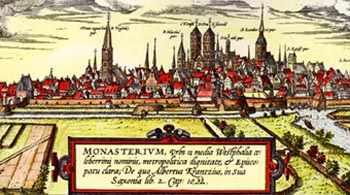
Many medieval cities, such as Munster above and Cluny below, began to develop around monasteries
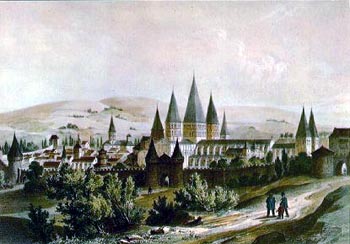 |
When the Muslim and barbarian dangers ceased to be a day-to-day problem for the medieval man, people started to travel and monasteries began to spring up in the woods, valleys or mountains. Then, groups of persons followed the monks to those solitary and uncultivated places where they had built their monasteries to be far from human contact.
They followed the monks to benefit from their spiritual influence. Today, the apostles have to seek out the people, who flee them. In that time it was the opposite, people followed the apostles who fled the world. So, monasteries became centers around which villages and cities were built.
There are some cities that retain this origin in their name, such as Moustier in France, or Munster in Germany. Moustier is the archaic French for monastery, and Munster is the German equivalent.
Other times villages and cities grew up around the castles or well-defended fortresses. With this new tendency, a considerable number of persons who lived in the feudal countryside working the land moved to the cities.
In the feudal organization, the lord’s relations with his subjects were that of father living among his children. The vassals married among themselves and the whole feudal estate took on the characteristics of a large family. The common people were a part of this family, in which they led lively and happy lives.
I remember reading about this particular topic in a book by Regine Pernoud, the famous French scholar on the Middle Ages. She asked what were the diversions of the common people at that time.
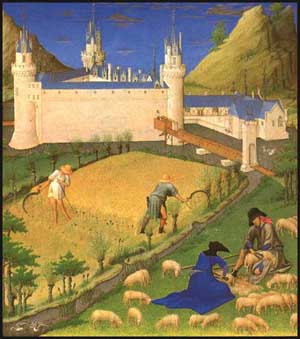
The village people were part of the life and family of the nobles in the castle |
She answered that their entertainment was to watch the movement and customs of the nobles in the castle. They would comment on their manners, clothing, ways of being, hunting excursions and music and songs, not as persons who were excluded from those entertainments, but as children of the same family who admired the other members. This was their distraction.
They did not have the envy that the Revolution would implant later into the lower classes to promote class struggle. For this reason they were able to admire the superiority of those who legitimately had more. They admired and followed their example, adapting themselves to the grandeur of the lord. They had also their share in those pleasures, assisting at the various religious and civil ceremonies, cooking and serving at their tables, hunting with them, and participating in countless ways in the lives of the nobles. Thus, the life of the castle was the focus of entertainment and the school of civilization for the peasants who lived around it.
The feudal estate was made up, therefore, of a group of families, or better, a family of families who gathered around the feudal lord.
Contention between the feudal power and the cities
What happened when these people moved to the cities?
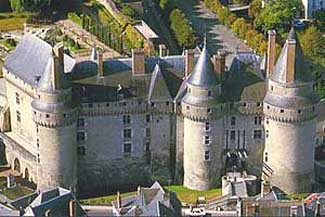
Langeais Castle in the Loire Valley was built for war, but was later transformed into a fine "country house for royalty" From its back, below, one can still see the medieval stone wall
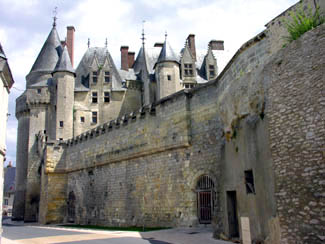
In the 16th century, luxury castles like Chambord, below, rose, built to be an enormous hunting resort for royalty
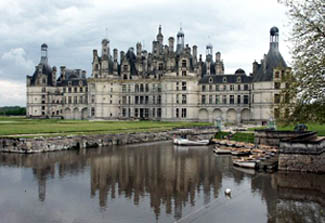
Many castles in France were destroyed during the French Revolution. Below, the ruins of the castle that overlooked the medieval city of Angles sur l'Anglin, Poitou
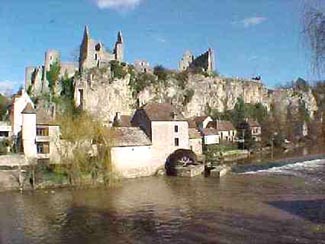
|
There was a tendency for those family networks to maintain the bonds of those tightly-knit relationships when they moved to the city. On the other hand, there was a tendency for the city to unravel those familiar networks, which were considered harmful to the interests of the city since the influence of the family leaders competed with that of the city authorities.
In a small or medium medieval city, one could have five, ten or twenty of these familiar networks formed by descendents of the old lords of the castles. Also, the descendents of peasants would form similar family networks that maintained their own habits and traditions.
Both types of groups would not pay much mind to the city administration, since for them what mattered was the chief of the family they belonged to, whose authority descended from their grandfathers who had resided in the countryside of the feudal estate. Those family groups adapted to the new circumstances in the city, but the influence of their leaders remained very strong and effective.
These two tendencies caused a clash between the respective powers – the power of the city attacked the power of the families. In each city and country that formed Christendom, this fight had a different history. It ended, however, with the victory of the Modern State, which completely absorbed the power of the families and established the reign of anonymity.
In France, for instance, the two reforms made by Richelieu and Colbert against feudal rights, respectively under Louis XIII and Louis XIV, destroyed the power of the families and the characteristics of feudal life. Therefore, by the time of Louis XIV, the king had become the great representative of a different kind of society, one that was the opposite of an organic society. He centralized everything as much as he could. Those reforms imposed by the Kings of France killed the roots of the French familiar feudal life and prepared the way for the Modern State made by the French Revolution. The latter would not have been possible without Richelieu and Colbert extinguishing the healthy familiar network in feudal life that had existed before.
Some persons wonder why there are not many medieval castles in France today, or at least not as many as in Spain and in Germany. The reason is simple, Richelieu used to give special financial assistance to those nobles who transformed their medieval castles into Renaissance-style palaces.
Under Louis XIV, a new wave of reforms swept through France changing the façades of castles to follow the latest architectural styles. Most of the medieval castles of France were destroyed by those reforms under Catholic Kings, which were made precisely to destroy the resistance the feudal rights offered against a centralized government power. The French Revolution destroyed only the little that remained. The obliteration or the reform of the medieval castle symbolizes what happened with the whole French medieval structure of society. Its destruction was made by the absolutist Kings and was finalized by the French Revolution and Napoleon.
Internal feudal rivalries and the rebirth of the monarchy
During the development of feudalism, the role of the king weakened greatly. Then, after its development, a problem naturally arose for many of those feudal lords.
There was still a king, but the lords had lost the habit of obeying him. Likewise, the king had almost completely lost the habit of commanding them. Very little was left of the old imperial or royal system. The new feudal reality had spread throughout the kingdom and represented a complete disarticulation of the old system. Next, each feud was a closed world, constituting a unity, a cell of a new system. Was it necessary to rearticulate this feudal system around the king?
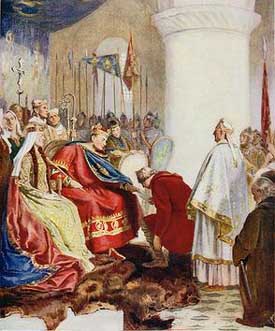
King William (1027-1087) granting a charter
to the City of London |
Why did this question come to the minds of the feudal lords? First, as homage to the royal power that none denied. Theoretically speaking, all the lords admitted that they should be under a monarchical power. Second, the kings were coming to play an important role in the defense of the country against another kind of adversary that cropped up. Until that time the adversary had been the non-Catholic enemy, either the Saracen or the barbarian. But then the adversary came to be the king of a neighboring country who united his feudal lords around him to conquer another kingdom. Thus the king of an attacked country became an important element to congregate the feudal lords and save the country.
The decrease of pressure coming from external adversaries gave birth to internal rivalries among the different countries of Christendom. Those rivalries gave each king a new role. Thus the identity of the country that had been lost during the development of feudalism began to return, with the king as the center. This re-articulation imposed by the circumstances was understood by all, causing the feudal lords to naturally obey the king once again and offer him a special homage.
In brief, there were two reasons for the king’s return to power:
- First, a moral reason with a religious background. The lords owed obedience to the king because, as in the case of France, he had been anointed by God, and in the case of the Holy Empire, he had been installed by the Pope.
- Then, a strategic reason. If the country wanted to maintain its identity in face of aggressions from neighboring kings, it was obliged to unite around a central force.
Therefore, in medieval history we find an oscillating movement. Power was centralized under Charlemagne; it became decentralized with Feudalism; and by the end of the Middle Ages it had again become centralized. This last movement of centralization, which no longer retained the monarchical power within legitimate boundaries, led to the absolute monarchs of the Renaissance, who in turn attacked what was left of the familiar and organic structure of feudalism that characterized medieval Christendom.

Posted August 22, 2007

  | | Prof. Plinio |
Organic Society was a theme dear to the late Prof. Plinio Corrêa de Oliveira. He addressed this topic on countless occasions during his life - at times in lectures for the formation of his disciples, at times in meetings with friends who gathered to study the social aspects and history of Christendom, at times just in passing.
Atila S. Guimarães selected excerpts of these lectures and conversations from the trancripts of tapes and his own personal notes. He translated and adapted them into articles for the TIA website. In these texts fidelity to the original ideas and words is kept as much as possible.

Related Topics of Interest
 Vocations of the European Peoples Vocations of the European Peoples
 The Organic Formation of Feudalism The Organic Formation of Feudalism
 Overview: Revolution and Counter-Revolution Overview: Revolution and Counter-Revolution
 What is Organic Society? What is Organic Society?
 The Steps of an Organic Relationship The Steps of an Organic Relationship
 Organic Society and Desire of Heaven Organic Society and Desire of Heaven
 The Moon and its Halo The Moon and its Halo
 Departure for the Crusade: A Desire for Sublimity Departure for the Crusade: A Desire for Sublimity
 Groups of Friends and Guilds Groups of Friends and Guilds

|
Organic Society | Social-Political | Home | Books | CDs | Search | Contact Us

© 2002- Tradition in Action, Inc. All Rights Reserved
|
 |
|